Settler colonialism
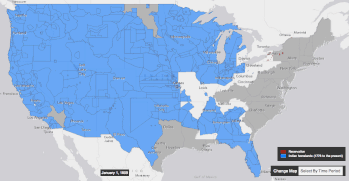
Settler colonialismis a logic and structure of displacement bysettlers,usingcolonial rule,over an environment for replacing it and itsindigenous peopleswith settlements and the society of the settlers.[1][2][3][4]
Settler colonialism is a form ofexogenous(of external origin, coming from the outside) domination typically organized or supported by animperial authority,which maintains a connection or control to the territory through the settler's colonialism.[5]Settler colonialism contrasts withexploitation colonialism,where the imperial powerconquers territoryto exploit thenatural resourcesand gain a source of cheap or freelabor.As settler colonialism entails the creation of a new society on the conquered territory, it lasts indefinitely unlessdecolonisationoccurs through departure of the settler population or through reforms to colonial structures, settler-indigenous compacts and reconciliation processes.[a][6]
Settler colonial studies has often focused on formerBritish colonies in North America,AustraliaandNew Zealand,which are close to the complete, prototypical form of settler colonialism.[7]However, settler colonialism is not restricted to any specific culture and has been practised by non-Europeans.[2]
Origins as a theory
During the 1960s, settlement and colonization were perceived as separate phenomena fromcolonialism.Settlement endeavours were seen as taking place in empty areas, downplaying the Indigenous inhabitants. Later on in the 1970s and 1980s, settler colonialism was seen as bringing high living standards in contrast to the failed political systems associated with classical colonialism. Beginning in the mid-1990s, the field of settler colonial studies was established[8][page needed]distinct but connected toIndigenous studies.[9]Although often credited with originating the field, Australian historianPatrick Wolfestated that "I didn't invent Settler Colonial Studies. Natives have been experts in the field for centuries."[10]Additionally, Wolfe's work was preceded by others that have been influential in the field, such asFayez Sayegh'sZionist Colonialism in PalestineandSettler CapitalismbyDonald Denoon.[10][8][page needed]
Definition and concept
Settler colonialism is a logic and structure, and not a mere occurrence. Settler colonialism takes claim of environments for replacing existing conditions and members of that environment with those of the settlement and settlers. Intrinsically connected to this is the displacement or elimination of existing residents, particularly through destruction of their environment and society.[1][2][3][4]As such, settler colonialism has been identified as a form ofenvironmental racism.[11]
Some scholars describe the process as inherentlygenocidal,considering settler colonialism to entail the elimination of existing peoples and cultures,[12]and not only their displacement (seegenocide,"the intentional destruction of a people in whole or in part" ).[citation needed]However, the opposite argument has also been made byLorenzo Veracini,who argues that all genocide is settler colonial in nature.[13]
Depending on the definition, it may be enacted by a variety of means, including mass killing of the previous inhabitants, removal of the previous inhabitants and/orcultural assimilation.[14]
Therefore, colonial settling has been called an invasion or occupation, emphazising the violent reality of colonization and its settling, instead of the more domestic meaning of settling.[15]
Settler colonialism is distinct from migration because immigrants aim to join an existing society, not replace it.[16][17]Mahmood Mamdaniwrites, "Immigrants are unarmed; settlers come armed with both weapons and a nationalist agenda. Immigrants come in search of a homeland, not a state; for settlers, there can be no homeland without a state."[17]Nevertheless, the difference is often elided by settlers who minimize the voluntariness of their departure, claiming that settlers are mere migrants, and some pro-indigenous positions which militantly simplify, claiming that all migrants are settlers.[18]
Thesettler stateis a state established through settler colonialism, by and for settlers.[19]
Examples

The settler colonial paradigm has been applied to a wide variety of conflicts around the world, includingNew Caledonia,[20]Western New Guinea,[21]theAndaman Islands,Argentina,[22]Australia,British Kenya,theCanary Islands,[23]Fiji,French Algeria,[24]Generalplan Ost,Hawaii,[25]Hokkaido,Ireland,[26]Israel/Palestine,Italian LibyaandEast Africa,[27][28]Kashmir,[29][30]KoreaandManchukuo,[31][32]Latin America,Liberia,New Zealand,northern Afghanistan,[33][34][35][36]North America,PosenandWest PrussiaandGerman South West Africa,[37]Rhodesia,Sápmi,[38][8][page needed][39][40]South Africa,South Vietnam,[41][42][43]andTaiwan.[7][44]
Africa

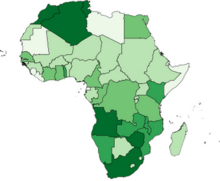
Canary Islands
During the fifteenth century, theKingdom of Castilesponsored expeditions byconquistadorsto subjugate under Castilian rule theMacaronesianarchipelago of the Canary Islands, located off the coast ofMoroccoand inhabited by the IndigenousGuanchepeople. Beginning with the start of the conquest of the island ofLanzaroteon 1 May 1402 and ending with the surrender of the last Guanche resistance onTenerifeon 29 September 1496 to the now-unifiedSpanish crown,the archipelago was subject to a settler colonial process involving systematic enslavement, mass murder, and deportation of the Guanches, who were replaced with Spanish settlers, in a process foreshadowing the Iberian colonisation of the Americas that followed shortly thereafter. Also like in the Americas, Spanish colonialists in the Canaries quickly turned to the importation of slaves from mainland Africa as a source of labour due to the decimation of the already small Guanche population by a combination of war, disease, and brutal forced labour. HistorianMohamed Adhikarihas labelled the conquest of the Canary Islands as the first overseas European settler colonial genocide.[23][38]
Moroccan-occupied Western Sahara

Since 1975, theKingdom of Moroccohas sponsored settlement schemes that have encouraged several thousand Moroccan citizens to settleMoroccan-occupiedWestern Saharaas part of theWestern Sahara conflict.On 6 November 1975, theGreen Marchtook place, during which about 350,000 Moroccan citizens crossed intoSaguia al-Hamrain the formerSpanish Saharaafter having received a signal from King Hassan II.[46]As of 2015, it is estimated thatMoroccan settlersconstitute two-thirds of the population of Western Sahara.[47]
Under international law, the transfer of Moroccan citizens into the occupied territory constitutes a direct violation ofArticle 49 of the Fourth Geneva Convention(cf.Turkish settlers in Northern CyprusandIsraeli settlers in the Palestinian territories).[48]
South Africa
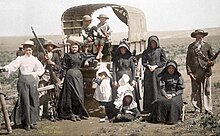
In 1652, the arrival of Europeans sparked the beginning of settler colonialism in South Africa. TheDutch East India Companywas set up at the Cape, and imported large numbers of slaves from Africa and Asia during the mid-seventeenth century.[49]The Dutch East India Company established a refreshment station for ships sailing between Europe and the east. The initial plan by Dutch East India Company officerJan van Riebeeckwas to maintain a small community around the new fort, but the community continued to spread and settle further than originally planned.[50]There was a historic struggle to achieve the intended British sovereignty that was achieved in other parts of theCommonwealth.State sovereignty belonged to theUnion of South Africa(1910–1961), followed by theRepublic of South Africa(1961–1994) and finally the modern dayRepublic of South Africa(1994–present day).[49]
In 1948, the policy ofApartheidwas introduced South Africa in order to segregate the races and ensure the domination of theAfrikanerminority over non-whites, politically, socially and economically.[51]As of 2014, the South African government has re-opened the period for land claims under the Restitution of Land Rights Amendment Act.[52]
Liberia
Liberia is often regarded by scholars as a unique example of settler colonialism and the only known instance of Black settler colonialism.[53]It is frequently described as anAfrican Americansettler colony tasked with establishing aWesternform of governance in Africa.[54]
Liberia was founded as the privatecolony of Liberiain 1822 by theAmerican Colonization Society,aWhite American-run organization, to relocate free African Americans to Africa, as part of theBack-to-Africa movement.[55]This settlement scheme stemmed from fears that free African Americans would assist slaves in escaping, as well as the widespread belief among White Americans that African Americans were inherently inferior and should thus be relocated.[56]U.S. presidentsThomas JeffersonandJames Madisonpublicly endorsed and funded the project.[55]Between 1822 and the early 20th century, around 15,000 African Americans colonized Liberia on lands acquired from the region's indigenous African population. The African American elite monopolized the government and establishedminority ruleover the locals. As they possessedWestern culture,they felt superior to the natives, whom they dominated and oppressed.[57]Indigenous revolts against theAmerico-Liberianelite such as the Grebo Revolt in 1909–1910 and Kru Revolt in 1915 were quelled with U.S. military support.[53][58]
North America
Canada

Attempts to assimilate the Indigenous peoples of what it is now Canada were rooted inimperial colonialismcentred around Europeanworldviewsand cultural practices, and a concept of land ownership based on thediscovery doctrine.[59]Original assimilation efforts were religiously-oriented beginning in the 17th century with the arrival of FrenchmissionariesinNew France.[60]Although not without conflict,European Canadians' early interactions withFirst NationsandInuitpopulations were relatively peaceful.[61]First Nations andMétispeoples (of mixed European and Indigenous ancestry) played a critical part in the development ofEuropean colonies in Canada,particularly for their role in assisting Europeancoureur des boisandvoyageursin their explorations of the continent during theNorth American fur trade.[62]
The early European interactions with First Nations would change fromfriendship and peace treatiestodispossession of lands through treatiesand displacement legislation such as theGradual Civilization Act,[63]theIndian Act,[64]thePotlatch ban,[65]and thepass system,[66]that focused on European ideals of Christianity, sedentary living, agriculture, and education.[67]
Indigenous groups in Canada continue to suffer fromracially motivated discrimination,despite living in one of the most progressive countries in the world.[68]Discriminatory practices such ascriminal justice inequity,police brutality,high incarnation rates,andhigh rates of violence against Indigenous womenhave been subject to legal and political review.[69]
United States
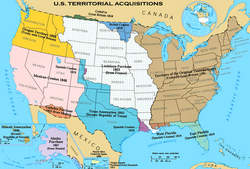

Incolonial America,European powerscreated economic dependency and imbalance of trade, incorporating Indigenous nations into spheres of influence and controlling them indirectly with the use of Christian missionaries and alcohol.[70]With the emergence of an independent United States, desire for land and the perceived threat of permanent Indigenous political and spatial structures led to violent relocation of many Indigenous tribes to the American West, in what is known as theTrail of Tears.[14]
In response to American encroachment on native land in the Great Lakes region, thePan-Indianconfederacies of theNorthwest ConfederacyandTecumseh's Confederacyemerged. Despite initial victories in both cases, such asSt. Clair's defeator thesiege of Detroit,both eventually lost, thereby paving the way for American control over the region. Settlement into conquered land was rapid. Following the 1795Treaty of Greenville,American settlers poured into southern Ohio, such that by 1810 it had a population of 230,760.[71]The defeat of the confederacies in the Great Lakes paved the way for large land loss in the region, via treaties such as theTreaty of Saginawwhich saw the loss of more than 4,000,000 acres of land.[72]
Frederick Jackson Turner, the father of the "frontier thesis" of American history, noted in 1901: "Our colonial system did not start with Spanish War; the U.S. had had a colonial history from the beginning...hidden under the phraseology of 'interstate migration' and territorial organization'".[70]While the United States government and local state governments directly aided this dispossession through theuse of military forces,ultimately this came about through agitation by settler society in order to gain access to Indigenous land. Especially in the US South, such land acquisition built plantation society and expanded the practice of slavery.[14]Settler colonialism participated in the formation of US cultures and lasted past the conquest, removal, or extermination of Indigenous people.[73][page needed]In 1928,Adolf Hitlerspoke admiringly of the impact of white settler colonialism on the Natives, stating the US had "gunned down the millions of Redskins to a few hundred thousand, and now keep the modest remnant under observation in a cage".[74]The practice of writing the Indigenous out of history perpetrated a forgetting of the full dimensions and significance of colonialism at both the national and local levels.[70]
Asia
China
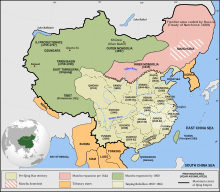
Near the end of their rule theQing dynastyattempted to colonizeXinjiang,Tibet,and other parts of the imperial frontier. To accomplish this goal, they began a policy of settler colonialism by whichHan Chinesewere resettled on the frontier.[75]This policy was renewed by the People's Republic of China, led byChinese Communist Party.[76][77]
Israel
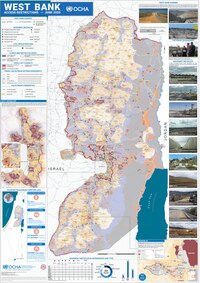
Zionismhas been characterized by some scholars as a form of settler colonialism concerningregion of Palestineand theIsraeli–Palestinian conflict.This academic framework has also been embraced by leftist groups and individuals involved inanti-Israelactivism and campus protests.[80][81][82]However, this viewpoint faces substantial criticism from scholars and is largely rejected by many Jews due to its perceived denial of thehistorical Jewish connection to Palestine,among other reasons.[79][80][81]
Many of the founding fathers ofZionismthemselves described the project as colonization, such asVladimir Jabotinsky,who said "Zionism is a colonization adventure."[83][84]Founder of theWorld Zionist Organization,Theodor Herzl,described the Zionist project as "something colonial" in a letter toCecil Rhodesin 1902.[85]
In 1967, the French historianMaxime Rodinsonwrote an article later translated and published in English asIsrael: A Colonial Settler-State?[86]Lorenzo VeracinidescribesIsraelas a colonial state and writes that Jewish settlers could expel the British in 1948 only because they had their own colonial relationships inside and outside Israel's new borders.[87]Veracini believes the possibility of an Israeli disengagement is always latent and this relationship could be severed, through an "accommodation of a Palestinian Israeli autonomy within the institutions of the Israeli state".[88][page needed]Other commentators, such asDaiva Stasiulis,Nira Yuval-Davis,[89]andJoseph Massadin the "Post Colonial Colony: time, space and bodies in Palestine/Israel in the persistence of the Palestinian Question"[90]have included Israel in their global analysis of settler societies.Ilan PappédescribesZionismand Israel in similar terms.[91][92]Scholar Amal Jamal, fromTel Aviv University,has stated, "Israel was created by a settler-colonial movement of Jewish immigrants".[93]Damien Short has accused Israel ofcarrying out genocideagainstPalestiniansduring theIsraeli–Palestinian conflictsince its inception within asettler colonialcontext.[94]
Writing in the 1990s, the Australian historianPatrick Wolfeis credited with originating the field.[10]He theorized settler colonialism as a structure (rather than an event) premised on the elimination rather than exploitation of the native population, thus distinguishing it from classical colonialism. Wolfe argued that settler colonialism was centered on the control of land, that it continued after the closing of the frontier, and that continued to exist today, classifyingIsrael as a modern form of settler colonialism.[14]His approach was defining for the field, but has been challenged by other scholars on the basis that many situations involve a combination of elimination and exploitation.[7]
Critics of the paradigm argue that Zionism does not fit the traditional framework of colonialism.S. Ilan Troenviews Zionism as the return of an indigenous population to its historic homeland, distinct from imperial expansion.[95]Most Jews oppose the paradigm, saying it denies theirhistorical connection to the landand aspirations forself-determination.[95][80][better source needed]Moses Lissak asserted that the settler-colonial thesis denies the idea that Zionism is the modernnational movementof theJewish people,seeking to reestablish a Jewish political entity in their historical territory. Zionism, Lissak argues, was both a national movement and a settlement movement at the same time, so it was not, by definition, a colonial settlement movement.[96]
Russia and the Soviet Union

Some scholars describe Russia as a settler colonial state, particularly in its expansion intoSiberiaand theRussian Far East,during which it displaced and resettled Indigenous peoples, while practicing settler colonialism.[97][98][99]The annexation ofSiberiaand the Far East to Russia was resisted by theIndigenous peoples,while theCossacksoften committed atrocities against them.[100]During the Cold War, new forms of Indigenous repression were practiced.[101]
This colonization continued even during theSoviet Unionin the 20th century.[102][page needed]The Soviet policy also sometimes included the deportation of the native population, as in the case of theCrimean Tatars.[103]
Taiwan
According to a PhD thesis by Lin-chin Tsai, currentethnic makeup of Taiwanis largely the result ofChinese settlercolonialism beginning in the seventeenth century.[104]
Australia

Europeans explored and settled Australia, displacingAboriginal and Torres Strait Islander peoples.TheIndigenous Australianpopulation was estimated at 795,000 at the time of European settlement.[105]Thepopulation declined steeplyfor 150 years following settlement from 1788, due to casualties frominfectious disease,theAustralian frontier warsand forced re-settlement and cultural disintegration.[106][107]
Responses
Settler colonialism exists in tension withindigenous studies.Some indigenous scholars believe that settler colonialism as a methodology can lead to overlooking indigenous responses to colonialism; however, other practitioners of indigenous studies believe that settler colonialism has important insights that are applicable to their work.[10]Settler colonialism as a theory has also been criticized from the standpoint ofpostcolonial theory.[10]Antiracismhas been criticized on the basis that it does not provide a special status for indigenous claims, and in response settler colonial theory has been criticized for potentially contributing to the marginalization of racialized immigrants.[108]
Political theoristMahmoud Mamdanisuggested that settlers could never succeed in their effort to become native, and therefore the only way to end settler colonialism was to erase the political significance of the settler–native dichotomy.[7]
According toChickasawscholar Jodi Byrd, in contrast to settler, the termarrivantrefers to enslaved Africans transported against their will, and to refugees forced into the Americas due to the effects of imperialism.[109]
In his bookEmpire of the People: Settler Colonialism and the Foundations of Modern Democratic Thought,political scientist Adam Dahl states that while it has often been recognized that "American democratic thought and identity arose out of the distinct pattern by which English settlers colonized the new world", histories are missing the "constitutive role of colonial dispossession in shaping democratic values and ideals".[110]
See also
Notes
- ^Example reconciliation programmes include:Reconciliation in Australia,andtruth and reconciliation commissionsinCanada,NorwayandSouth Africa.
References
- ^abCarey, Jane; Silverstein, Ben (2 January 2020)."Thinking with and beyond settler colonial studies: new histories after the postcolonial".Postcolonial Studies.23(1): 1–20.doi:10.1080/13688790.2020.1719569.hdl:1885/204080.ISSN1368-8790.S2CID214046615.
The key phrases Wolfe coined here – that invasion is a 'structure not an event'; that settler colonial structures have a 'logic of elimination' of Indigenous peoples; that 'settlers come to stay' and that they 'destroy to replace' – have been taken up as the defining precepts of the field and are now cited by countless scholars across numerous disciplines.
- ^abcVeracini, Lorenzo (2017)."Introduction: Settler colonialism as a distinct mode of domination".In Cavanagh, Edward; Veracini, Lorenzo (eds.).The Routledge Handbook of the History of Settler Colonialism.Routledge.p. 4.ISBN978-0-415-74216-0.
Settler colonialism is a relationship. It is related to colonialism but also inherently distinct from it. As a system defined by unequal relationships (like colonialism) where an exogenous collective aims to locally and permanently replace indigenous ones (unlike colonialism), settler colonialism has no geographical, cultural or chronological bounds. It is culturally nonspecific... It can happen at any time, and everyone is a settler if they are part of a collective and sovereign displacement that moves to stay, that moves to establish a permanent homeland by way of displacement.
- ^abMcKay, Dwanna L.; Vinyeta, Kirsten; Norgaard, Kari Marie (September 2020)."Theorizing race and settler colonialism within U.S. sociology".Sociology Compass.14(9).doi:10.1111/soc4.12821.ISSN1751-9020.S2CID225377069.
Settler-colonialism describes the logic and operation of power when colonizers arrive and settle on lands already inhabited by another group. Importantly, settler colonialism operates through a logic of elimination, seeking to eradicate the original inhabitants through violence and other genocidal acts and to replace the existing spiritual, epistemological, political, social, and ecological systems with those of the settler society.
- ^abWhyte, Kyle (1 September 2018). "Settler Colonialism, Ecology, and Environmental Injustice".Environment and Society.9(1): 125–144.doi:10.3167/ares.2018.090109.ISSN2150-6779.
- ^LeFevre, Tate."Settler Colonialism".oxfordbibliographies.com.Tate A. LeFevre.Retrieved19 October2017.
Though often conflated with colonialism more generally, settler colonialism is a distinct imperial formation. Both colonialism and settler colonialism are premised on exogenous domination, but only settler colonialism seeks to replace the original population of the colonized territory with a new society of settlers (usually from the colonial metropole).
- ^Veracini, Lorenzo (October 2007)."Settler Colonialism and Decolonisation".Borderlands.6(2).
- ^abcdEnglert, Sai (2020). "Settlers, Workers, and the Logic of Accumulation by Dispossession".Antipode.52(6): 1647–1666.Bibcode:2020Antip..52.1647E.doi:10.1111/anti.12659.hdl:1887/3220822.S2CID225643194.
- ^abcVeracini 2013.
- ^Shoemaker, Nancy (1 October 2015)."A Typology of Colonialism | Perspectives on History".American Historical Association.Retrieved28 April2022.
- ^abcdefKauanui, J. Kēhaulani (3 April 2021). "False dilemmas and settler colonial studies: response to Lorenzo Veracini: 'Is Settler Colonial Studies Even Useful?'".Postcolonial Studies.24(2): 290–296.doi:10.1080/13688790.2020.1857023.ISSN1368-8790.S2CID233986432.
- ^Van Sant, Levi; Milligan, Richard; Mollett, Sharlene (2021). "Political Ecologies of Race: Settler Colonialism and Environmental Racism in the United States and Canada".Antipode.53(3): 629–642.Bibcode:2021Antip..53..629V.doi:10.1111/anti.12697.ISSN0066-4812.
- ^Short, Damien (2016).Redefining Genocide: Settler Colonialism, Social Death and Ecocide.Bloomsbury Publishing. p. 69.ISBN978-1-84813-546-8.
- ^Veracini, Lorenzo(2021). "Colonialism, Frontiers, Genocide: Civilian-Driven Violence in Settler Colonial Situations".Civilian-Driven Violence and the Genocide of Indigenous Peoples in Settler Societies.Routledge.ISBN978-1-000-41177-5.
not only is genocide necessarily settler colonial (even though settler colonialism is not always genocidal or even successful)
- ^abcdeWolfe, Patrick(2006)."Settler colonialism and the elimination of the native".Journal of Genocide Research.8(4): 387–409.doi:10.1080/14623520601056240.ISSN1462-3528.S2CID143873621.
- ^Kilroy, Peter (22 May 2024)."Discovery, settlement or invasion? The power of language in Australia's historical narrative".The Conversation.Retrieved14 August2024.
- ^Veracini 2015,p. 40.
- ^abMamdani 2020,p. 253.
- ^Veracini 2015,p. 35.
- ^Tozer, Angela (2021). "Democracy in a Settler State?: Settler Colonialism and the Development of Canada, 1820–67".Constant Struggle: Histories of Canadian Democratization.McGill-Queen's University Press. pp. 87–115.doi:10.2307/j.ctv1z7kjww.7.ISBN978-0-2280-0866-8.JSTORj.ctv1z7kjww.7.Retrieved9 November2024.
- ^"New Caledonia set for 2nd referendum on independence from France".Al Jazeera.3 October 2020.
- ^McNamee, Lachlan (15 May 2020)."Indonesian Settler Colonialism in West Papua".SSRN3601528.
- ^Larson, Carolyne R. (2020).The Conquest of the Desert: Argentina's Indigenous Peoples and the Battle for History.University of New Mexico Press.ISBN9780826362087.
- ^abAdhikari, Mohamed(7 September 2017)."Europe's First Settler Colonial Incursion into Africa: The Genocide of Aboriginal Canary Islanders".African Historical Review.49(1): 1–26.doi:10.1080/17532523.2017.1336863.S2CID165086773.Retrieved7 May2022.
- ^Barclay, Fiona; Chopin, Charlotte Ann; Evans, Martin (12 January 2017)."Introduction: settler colonialism and French Algeria".Settler Colonial Studies.8(2): 115–130.doi:10.1080/2201473X.2016.1273862.hdl:1893/25105.S2CID151527670.
- ^Takumi, Roy (1994)."Challenging U.S. Militarism in Hawai'i and Okinawa".Race, Poverty & the Environment.4/5(4/1): 8–9.ISSN1532-2874.JSTOR41555279.
- ^Connolly, S. (2017). Settler colonialism in Ireland from the English conquest to the nineteenth century. In E. Cavanagh, & L. Veracini (Eds.),The Routledge Handbook of the History of Settler Colonialism(pp. 49-64). Article 4Routledge.
- ^Ertola, Emanuele (15 March 2016)."'Terra promessa': migration and settler colonialism in Libya, 1911–1970 ".Settler Colonial Studies.7(3): 340–353.doi:10.1080/2201473X.2016.1153251.S2CID164009698.Retrieved7 May2022.
- ^Veracini, Lorenzo (Winter 2018)."Italian Colonialism through a Settler Colonial Studies Lens".Journal of Colonialism and Colonial History.19(3).doi:10.1353/cch.2018.0023.S2CID165512037.Retrieved7 May2022.
- ^Raman, Anita D. (2004)."Of Rivers and Human Rights: The Northern Areas, Pakistan's forgotten colony in Jammu and Kashmir".International Journal on Minority and Group Rights.11(1/2): 187–228.doi:10.1163/157181104323383929.JSTOR24675261.
- ^Mushtaq, Samreen; Mudasir, Amin (16 October 2021)."'We will memorise our home': exploring settler colonialism as an interpretive framework for Kashmir ".Third World Quarterly.42(12): 3012–3029.doi:10.1080/01436597.2021.1984877.S2CID244607271.Retrieved7 May2022.
- ^Lu, Sidney Xu (June 2019)."Eastward Ho! Japanese Settler Colonialism in Hokkaido and the Making of Japanese Migration to the American West, 1869–1888".The Journal of Asian Studies.78(3): 521–547.doi:10.1017/S0021911819000147.S2CID197847093.Retrieved7 May2022.
- ^Uchida, Jun (3 March 2014).Brokers of Empire: Japanese Settler Colonialism in Korea, 1876–1945.Vol. 337.Harvard University Asia Center.doi:10.2307/j.ctt1x07x37.ISBN978-0674492028.JSTORj.ctt1x07x37.S2CID259606289.
- ^Christian Bleuer (2012)."State-building, migration and economic development on the frontiers of northern Afghanistan and southern Tajikistan".Journal of Eurasian Studies.3:69–79.doi:10.1016/j.euras.2011.10.008.
- ^Bleuer, Christian (17 October 2014)."From 'Slavers' to 'Warlords': Descriptions of Afghanistan's Uzbeks in Western Writing".Afghanistan Analysts Network.
- ^Mundt, Alex; Schmeidl, Susanne; Ziai, Shafiqullah (1 June 2009)."Between a Rock and a Hard Place: The Return of Internally Displaced Persons to Northern Afghanistan".Brookings Institution.
- ^"Paying for the Taliban's Crimes: Abuses Against Ethnic Pashtuns in Northern Afghanistan"(PDF).Human Rights Watch.April 2002.
- ^Lerp, Dörte (11 October 2013)."Farmers to the Frontier: Settler Colonialism in the Eastern Prussian Provinces and German Southwest Africa".Journal of Imperial and Commonwealth History.41(4): 567–583.doi:10.1080/03086534.2013.836361.S2CID159707103.Retrieved7 May2022.
- ^abAdhikari, Mohamed(25 July 2022).Destroying to Replace: Settler Genocides of Indigenous Peoples.Indianapolis: Hackett Publishing Company. pp. 1–32.ISBN978-1647920548.
- ^Browning, Christopher R. (8 February 2022)."Yehuda Bauer, the Concepts of Holocaust and Genocide, and the Issue of Settler Colonialism".The Journal of Holocaust Research.36(1): 30–38.doi:10.1080/25785648.2021.2012985.S2CID246652960.Retrieved30 April2022.
- ^Rahman, Smita A.; Gordy, Katherine A.; Deylami, Shirin S. (2022).Globalizing Political Theory.Taylor & Francis.ISBN9781000788884.
- ^Salemink, Oscar (2003).The Ethnography of Vietnam's Central Highlanders: A Historical Contextualization, 1850–1990.University of Hawaii Press.pp. 35–336.ISBN978-0-8248-2579-9.
- ^Nguyen, Duy Lap (2019).The unimagined community: Imperialism and culture in South Vietnam.Manchester University Press.ISBN978-1-52614-398-3.
- ^Schweyer, Anne-Valérie (2019)."The Chams in Vietnam: a great unknown civilization".French Academic Network of Asian Studies.
- ^Tsai, Lin-chin (2019).Re-conceptualizing Taiwan: Settler Colonial Criticism and Cultural Production(Thesis).UCLA.
- ^Cowan, L. Gray (1964).The Dilemmas of African Independence.New York: Walker & Company, Publishers. pp. 42–55, 105.ASINB0007DMOJ0.
- ^Hamdaoui, Neijma (31 October 2003)."Hassan II lance la Marche verte"[Hassan II launches the Green March].JeuneAfrique.com(in French). Archived fromthe originalon 3 January 2006.Retrieved21 April2015.
- ^Shefte, Whitney (6 January 2015)."Western Sahara's stranded refugees consider renewal of Morocco conflict".The Guardian.
- ^"Mixed Reviews for Morocco as Fourth Committee Hears Petitioners on Western Sahara, Amid Continuing Decolonization Debate | Meetings Coverage and Press Releases".United Nations.
- ^abCavanagh, E (2013).Settler colonialism and land rights in South Africa: Possession and dispossession on the Orange River.United Kingdom:Palgrave Macmillan.pp. 10–16.ISBN978-1-137-30577-0.
- ^Fourie, J (2014). "Settler Skills and Colonial Development: The Huguenot Wine-Makers in Eighteenth-Century Dutch South Africa".Economic History Review.67(4): 932–963.doi:10.1111/1468-0289.12033.S2CID152735090.
- ^Mayne, Alan (1999).From Politics Past to Politics Future: An Integrated Analysis of Current and Emergent Paradigms.Westport, Connecticut:Praeger.p. 52.ISBN978-0-275-96151-0.
- ^Weinberg, T (2015). "The Griqua Past and the Limits of South African History, 1902–1994; Settler Colonialism and Land Rights in South Africa: Possession and Dispossession on the Orange River".Journal of Southern African Studies.41:211–214.doi:10.1080/03057070.2015.991591.S2CID144750398.
- ^abSpence, David M. (2021)."From Victims to Colonizers"(PDF).The SOAS Journal of Postgraduate Research.
- ^Parkins, Daniel (2019)."Colonialism, Postcolonialism, and the Drive for Social Justice: A Historical Analysis of Identity Based Conflicts in the First Republic of Liberia".SIT Graduate Institute.
- ^ab"Founding of Liberia, 1847".Office of the Historian.Retrieved24 May2024.
- ^Nicholas Guyatt, “The American Colonization Society: 200 Years of the “Colonizing Trick”,Black Perspectives, African American Intellectual History Society,December 22, 2016; Nicholas Guyatt, “The American Colonization Society’s plans for abolishing slavery,”Oxford University Press’s Academic Insights for the Thinking World,December 22, 2016, /.
- ^Akpan, M. B. (10 March 2014)."Black Imperialism: Americo-Liberian Rule over the African Peoples of Liberia, 1841–1964".Canadian Journal of African Studies(in French).7(2): 217–236.doi:10.1080/00083968.1973.10803695.ISSN0008-3968.
- ^"Liberia: The African-American settler colony that parallels Israel".Middle East Eye.Retrieved24 May2024.
- ^"The Doctrine of Discovery".CMHR.2 November 2022.Retrieved21 November2024.
- ^Gourdeau, Claire."Population – Religious Congregations".Virtual Museum of New France.Canadian Museum of History. Archived fromthe originalon 8 July 2016.Retrieved1 July2016.
- ^Preston, David L. (2009).The Texture of Contact: European and Indian Settler Communities on the Frontiers of Iroquoia, 1667–1783.University of Nebraska Press.pp. 43–44.ISBN978-0-8032-2549-7.Archivedfrom the original on 16 March 2023.Retrieved10 February2019.
- ^Miller, J. R. (2009).Compact, Contract, Covenant: Aboriginal Treaty-Making in Canada.University of Toronto Press.p. 34.ISBN978-1-4426-9227-5.Archivedfrom the original on 16 March 2023.Retrieved10 February2019.
- ^"Gradual Civilization Act, 1857"(PDF).Government of Canada. Archived fromthe original(PDF)on 24 March 2024.Retrieved17 October2015.
- ^"Indian Act".Site Web de la législation (Justice).15 August 2019. Archived fromthe originalon 26 May 2024.Retrieved2 September2024.
- ^"Potlatch Ban".The Canadian Encyclopedia.11 January 2024. Archived fromthe originalon 16 August 2024.Retrieved3 September2024.
- ^What We Have Learned: Principles of Truth and Reconciliation(PDF)(Report). 2015. p. 192.ISBN978-0-660-02073-0.Archived fromthe original(PDF)on 7 June 2021.
- ^
- Williams, L. (2021).Indigenous Intergenerational Resilience: Confronting Cultural and Ecological Crisis.Routledge Studies in Indigenous Peoples and Policy.Routledge.p. 51.ISBN978-1-000-47233-2.Archivedfrom the original on 23 February 2023.Retrieved23 February2023.
- Turner, N. J. (2020).Plants, People, and Places: The Roles of Ethnobotany and Ethnoecology in Indigenous Peoples' Land Rights in Canada and Beyond.McGill-Queen's Indigenous and Northern Studies.McGill-Queen's University Press.p. 14.ISBN978-0-2280-0317-5.Archivedfrom the original on 23 February 2023.Retrieved23 February2023.
- Asch, Michael (1997).Aboriginal and Treaty Rights in Canada: Essays on Law, Equity, and Respect for Difference.University of British Columbia Press.p. 28.ISBN978-0-7748-0581-0.
- Kirmayer, Laurence J.; Guthrie, Gail Valaskakis (2009).Healing Traditions: The Mental Health of Aboriginal Peoples in Canada.University of British Columbia Press.p. 9.ISBN978-0-7748-5863-2.
- "Indigenous Peoples and Government Policy in Canada".The Canadian Encyclopedia.6 June 1944.Retrieved20 November2024.
- ^Snelgrove, Corey; Dhamoon, Rita Kaur; Corntassel, Jeff (2014)."Unsettling settler colonialism: The discourse and politics of settlers, and solidarity with Indigenous nations"(PDF).Decolonization: Indigeneity, Education & Society.3(2): 11–12. Archived fromthe original(PDF)on 4 January 2017.
- ^"Understanding the Overrepresentation of Indigenous People".State of the Criminal Justice System Dashboard.11 June 2024.Retrieved21 November2024.
- ^abcDunbar-Ortiz, Roxanne (2014).An Indigenous Peoples' History of the United States.Boston:Beacon Press.ISBN978-0-8070-0040-3.
- ^https://www.issuelab.org/resources/3973/3973.pdf[bare URL PDF]
- ^"The 1819 Treaty of Saginaw".26 November 2019.
- ^Spady, James O'Neil (2020).Education and the Racial Dynamics of Settler Colonialism in Early America: Georgia and South Carolina, ca. 1700 - ca. 1820.Routledge.ISBN978-0367437169.
- ^Moon, David (2020).The American Steppes.Cambridge University Press.p. 44.
- ^Wang, Ju-Han Zoe; Roche, Gerald (16 March 2021)."Urbanizing Minority Minzu in the PRC: Insights from the Literature on Settler Colonialism".Modern China.48(3): 593–616.doi:10.1177/0097700421995135.ISSN0097-7004.S2CID233620981.
- ^Brooks, Jonathan (2021),Settler Colonialism, Primitive Accumulation, and Biopolitics in Xinjiang, China,doi:10.2139/ssrn.3965577,ISSN1556-5068,SSRN3965577
- ^Clarke, Michael (16 February 2021). "Settler Colonialism and the Path toward Cultural Genocide in Xinjiang".Global Responsibility to Protect.13(1): 9–19.doi:10.1163/1875-984X-13010002.ISSN1875-9858.S2CID233974395.
- ^abPowell, Michael (5 January 2024)."The Curious Rise of 'Settler Colonialism' and 'Turtle Island'".The Atlantic.Retrieved22 May2024.
- ^abTroen, S. Ilan (2007). "De-Judaizing the Homeland: Academic Politics in Rewriting the History of Palestine".Israel Affairs.13(4): 872–884.doi:10.1080/13537120701445372.S2CID216148316.
- ^abcSchuessler, Jennifer (22 January 2024)."What Is 'Settler Colonialism'?".The New York Times.ISSN0362-4331.Retrieved7 July2024.
- ^abCohen, Roger (10 December 2023)."Who's a 'Colonizer'? How an Old Word Became a New Weapon".The New York Times.ISSN0362-4331.Retrieved7 July2024.
- ^Kirsch, Adam (26 October 2023)."Campus Radicals and Leftist Groups Have Embraced the Idea of 'Settler Colonialism'".The Wall Street Journal.Retrieved7 July2024.
- ^Hart, Alan (13 August 2010).Zionism: The Real Enemy of the Jews.Vol. 1: The False Messiah. SCB Distributors.ISBN978-0-932863-78-2.
A voluntary reconciliation with the Arabs is out of the question either now or in the future. If you wish to colonize a land in which people are already living, you must provide a garrison for the land, or find some rich man or benefactor who will provide a garrison on your behalf. Or else-or else, give up your colonization, for without an armed force which will render physically impossible any attempt to destroy or prevent this colonization, colonization is impossible, not difficult, not dangerous, but IMPOSSIBLE!... Zionism is a colonization adventure and therefore it stands or falls by the question of armed force. It is important... to speak Hebrew, but, unfortunately, it is even more important to be able to shoot – or else I am through with playing at colonizing.
- ^Jabotinsky, Ze'ev (4 November 1923)."The Iron Wall"(PDF).
Colonisation can have only one aim, and Palestine Arabs cannot accept this aim. It lies in the very nature of things, and in this particular regard nature cannot be changed...Zionist colonisation must either stop, or else proceed regardless of the native population.
- ^Gelber, Mark H.; Liska, Vivian, eds. (2012).Theodor Herzl: From Europe to Zion.De Gruyter.pp. 100–101.
- ^Rodinson, Maxime. "Israel, fait colonial?"Les Temps Moderne,1967. Republished in English asIsrael: A Colonial Settler-State?,New York, Monad Press, 1973.
- ^"Israel could celebrate its anticolonial/anti-British struggle exactlybecause it was able to establish a number of colonial relationships within and without the borders of 1948. "Lorenzo Veracini, Borderlands, vol 6 No 2, 2007.
- ^Veracini, Lorenzo (2006).Israel and Settler Society.London:Pluto Press.
- ^Unsettling Settler Societies: Articulations of Gender, Race, Ethnicity and Class, Vol. 11,Nira Yuval-Davis (Editor), Daiva K Stasiulis (Editor), Paperback 352pp,ISBN978-0-8039-8694-7,August 1995SAGE Publications.
- ^"Post Colonial Colony: time, space and bodies in Palestine/Israel in the persistence of the Palestinian Question",Routledge,NY, (2006) and "The Pre-Occupation of Post-Colonial Studies" ed. Fawzia Afzal-Khan and Kalpana Rahita Seshadri. (Durham:Duke University Press)
- ^The Palestinian Enclaves Struggle: An Interview with Ilan Pappé,King's Review – Magazine
- ^Video:Decolonizing Israel. Ilan Pappé on Viewing Israel-Palestine Through the Lens of Settler-Colonialism.Antiwar.com,5 April 2017
- ^Amal Jamal (2011).Arab Minority Nationalism in Israel: The Politics of Indigeneity.Taylor & Francis. p. 48.ISBN978-1-136-82412-8.
- ^Short, Damien (December 2012)."Genocide and settler colonialism: can a Lemkin-inspired genocide perspective aid our understanding of the Palestinian situation?".The International Journal of Human Rights.
- ^abTroen, S. Ilan (2007). "De-Judaizing the Homeland: Academic Politics in Rewriting the History of Palestine".Israel Affairs.13(4): 872–884.doi:10.1080/13537120701445372.S2CID216148316.
- ^Moshe Lissak, "'Critical' Sociology and 'Establishment' Sociology in the Israeli Academic Community: Ideological Struggles or Academic Discourse?"Israel Studies1:1 (1996), 247-294.
- ^Sunderland, Willard (2000). "The 'Colonization Question': Visions of Colonization in Late Imperial Russia".Jahrbücher für Geschichte Osteuropas.48(2): 210–232.JSTOR41050526.
- ^Forsyth, James (1992).A history of the peoples of Siberia.Internet Archive.Cambridge University Press.pp. 201–228, 241–346.ISBN978-0-521-40311-5.
- ^Lantzeff, George V.; Pierce, Richard A. (1973).Eastward to Empire: Exploration and Conquest on the Russian Open Frontier to 1750.McGill-Queen's University Press.doi:10.2307/j.ctt1w0dbpp.JSTORj.ctt1w0dbpp.
- ^Hill, Nathaniel (25 October 2021)."Conquering Siberia: The Case for Genocide Recognition".www.genocidewatchblog.com.Retrieved3 April2023.
- ^Bartels, Dennis; Bartels, Alice L. (2006). "Indigenous Peoples of the Russian North and Cold War Ideology".Anthropologica.48(2): 265–279.doi:10.2307/25605315.JSTOR25605315.
- ^Veracini 2013:"The domination of Latin America, North America, Australia, New Zealand, South Africa, and the Asian part of the Soviet Union by European powers all involved the migration of permanent settlers from the European country to the colonies. These places were colonized."
- ^Pohl, Otto (2015)."The Deportation of the Crimean Tatars in the Context of Settler Colonialism".International Crimes and History(16).
- ^Tsai, Lin-chin (2019).Re-conceptualizing Taiwan: Settler Colonial Criticism and Cultural Production(PhD thesis).University of California.Retrieved20 May2023.
Taiwan, an island whose indigenous inhabitants are Austronesian, has been a de facto settler colony due to large-scale Han migration from China to Taiwan beginning in the seventeenth century.
- ^Statistics compiled by Ørsted-Jensen for Frontier History Revisited (Brisbane 2011), page 15.
- ^Page, A. (September 2015)."The Australian Settler State, Indigenous Agency, and the Indigenous Sector in the Twenty First Century"(PDF).Australian Political Studies Association Conference.
{{cite journal}}:Cite journal requires|journal=(help) - ^Page, A.; Petray, T. (2015). "Agency and Structural Constraints: Indigenous Peoples and the Settler-State in North Queensland".Settler Colonial Studies.5(2).
- ^Veracini 2015,p. 44.
- ^Byrd, Jodi A. (6 September 2011).The Transit of Empire: Indigenous Critiques of Colonialism.University of Minnesota Press.pp. xix.ISBN978-1-4529-3317-7.
- ^Dahl 2018,p. 1.
Works cited
- Dahl, Adam (2018).Empire of the People: Settler Colonialism and the Foundations of Modern Democratic Thought.University Press of Kansas.ISBN978-0-7006-2607-6.
- Veracini, Lorenzo (2013)."'Settler Colonialism': Career of a Concept ".The Journal of Imperial and Commonwealth History.41(2): 313–333.doi:10.1080/03086534.2013.768099.S2CID159666130.Retrieved7 May2022.
Further reading
- Adhikari, Mohamed(2021).Civilian-Driven Violence and the Genocide of Indigenous Peoples in Settler Societies.Routledge.ISBN978-1-000-41177-5.
- Cox, Alicia."Settler Colonialism".Oxford Bibliographies.Oxford University Press.Retrieved21 January2021.
- Englert, Sai (2022).Settler Colonialism: An Introduction.Pluto Press.ISBN978-0-7453-4490-4.
- Belich, James(2009).Replenishing the earth: the settler revolution and the rise of the Anglo-world, 1783–1939.Oxford:Oxford University Press.p. 573.ISBN978-0-19-929727-6.
- Horne, Gerald.The Apocalypse of Settler Colonialism: The Roots of Slavery, White Supremacy, and Capitalism in Seventeenth-Century North America and the Caribbean.Monthly Review Press,2018. 243p.ISBN9781583676639
- Horne, Gerald.The Dawning of the Apocalypse: The Roots of Slavery, White Supremacy, Settler Colonialism, and Capitalism in the Long Sixteenth Century.Monthly Review Press, 2020.ISBN978-1-58367-875-6.
- Mamdani, Mahmood (2020).Neither Settler nor Native.Harvard University Press.ISBN978-0-674-98732-6.
- Manjapra, Kris (2020). "Settlement".Colonialism in Global Perspective.Cambridge University Press.pp. 43–70.ISBN978-1-108-42526-1.
- Marx, Christoph (2017).Settler Colonies,EGO - European History Online,Mainz:Institute of European History,retrieved: March 17, 2021 (pdf).
- Mikdashi, Maya (2013).What is settler colonialism?American Indian Culture and Research Journal37.2: 23–34.
- Pedersen, Susan;Elkins, Caroline,eds. (2005).Settler Colonialism in the Twentieth Century.Routledge.
- Sakai, J. (1983).Settlers: The Mythology of the White Proletariat.PM Press.ISBN978-1-62963-037-3.
- Veracini, Lorenzo (2010).Settler Colonialism: A Theoretical Overview.Hampshire, UK:Palgrave MacMillan.p. 182.ISBN9780230284906.
- Veracini, Lorenzo (2015).The Settler Colonial Present.Springer.ISBN978-1-137-37247-5.
- Wolfe, Patrick(2016).Traces of History: Elementary Structures of Race.Verso Books.
